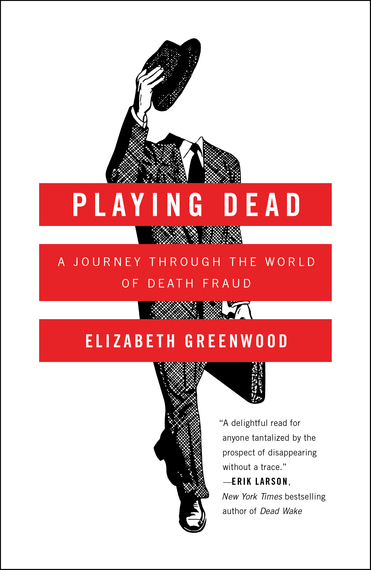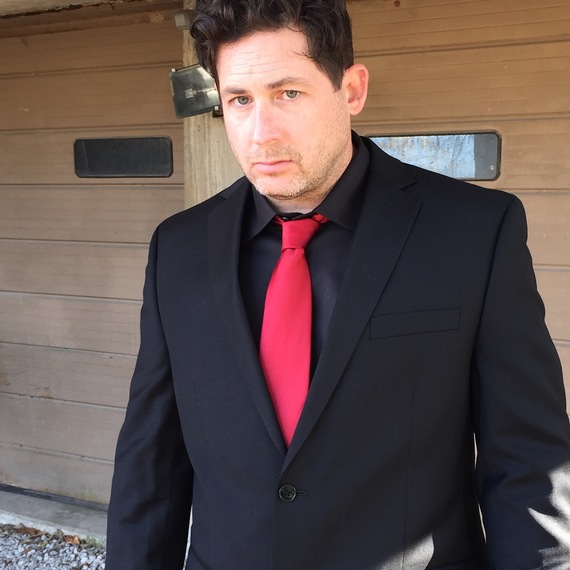Elizabeth Greenwood, the author of Playing Dead: A Journey Through the World of Death Fraud, a riveting new book, out August 9th, on Simon and Schuster knows a lot about how to fake your death. Considering that I faked my own suicide and became a member of the US Marshal's Top 15 Most Wanted Fugitive list I knew that Elizabeth and I had more than a little to talk about. The how and whys of orchestrating your own disappearance is all in the details. Details that are hard to come by unless you've done it yourself. We talked about the pressures that people are under to fake their deaths, the plans that people come up with to do it and how the best death frauds are carried out allowing people to be reborn. Free of their previous life or the weight that made them want to escape in the first place. The following is a condensed version of that conversation. Two experts comparing notes on what is becoming more common day by day.
Seth: What are the reasons people fake their deaths?
Elizabeth: People fake their deaths for a whole host of reasons. Some are amazingly laughable, like Ann Gray, who got out of a date by pretending to be her sister delivering the bad news to the would-be Romeo. In an effort to evade donation solicitations, alumni Erik H. Gordon sent a hysterical obituary to Harvard Magazine stating he had perished in a tragic hot air ballooning accident and left behind his beloved pet monkey Cher. And haven't we all wanted to call in dead to work?
But when people seek to fake their deaths in all seriousness, the stakes tend to be very high. Sam Israel III did it by staging his suicide off the Bear Mountain Bridge in 2008 after losing nearly half a billion dollars in his Bayou Group Hedge Fund. Steven Chin Leung is the only known death fraudster (who got caught at least) to attempt to end his life on paper in the 9/11 attacks. He'd been living on an expired visa and had the brilliant idea to assume a new identity in his afterlife. Tragically, one Pennsylvania woman faked a seizure and played dead while her scumbag boyfriend was beating her. She ended up saving her own life. To pull off a successful pseudocide, you really can't ever go back. You have to cut all ties with friends and family, and you can't even continue the same activities you once enjoyed because that'll get you caught. So, the motive has to be particularly exigent. What pressures were you under when you faked your death, Seth?
Seth: It was either 10 to life or snitch on my friends. That was basically the choice I was given when I was arrested for an LSD conspiracy in the suburbs of Fairfax, Virginia in 1991. My case was federal, that was the United States of fucking America versus me. I was barely 20 years old. I didn't know about the conspiracy laws, or mandatory minimums or sentencing guidelines. I was just a kid from the suburbs. Neither prospect appealed to me so I took off.
I was forced to reinvent myself. From an outlaw drug dealer to a fugitive. I didn't really know what I was in for. I just knew that I was through with being Seth Ferranti.
Elizabeth: Makes a lot of sense. How did you come up with the plan to fake your death, and how did you stay disappeared? Coming up with a believable fatal accident is really the toughest part about faking your death. Most people think staging a drowning is the way to go since you avoid the problem of having to produce a body. But a lot of the experts and investigators I spoke with all agreed that never coming back from a swim actually raises red flags. Most bodies will wash ashore or float up eventually, so why not this one? And back in 1991, you didn't have a digital footprint to worry about--your internet search terms, IP addresses, cell phone records--so do you think it was easier to lay low back then? Is there anything you would do differently today?
Seth: I faked my suicide at Great Falls, a national park in Northern Virginia. I went the drowning route. It seemed logical to me. Jumping into the Potomac River, where there are class five rapids, I'd either drown or get smashed against the rocks. I set the stage and made it appear like I was on the cliffs and then jumped in. But you're right. The US Park Police didn't find a body. They dragged the river for two weeks and called my suicide a hoax. I figured the body would wash out to see and in seven years I could be declared legally dead. That was my plan at least.
No digital footprint back then so it was easier, but I still had to get ID and establish an identity and all that. I believe you can do the same thing today. It's just about introducing a little misdirection. If I did it today I would probably disappear in a national forest. That seems to be the way to go.
Elizabeth: I absolutely agree. The fancier and more elaborate the scenario, the more variables you create, and therefore opportunities to get busted. Going off on a hike one day and never coming back is an elegant exit. You don't have to write a suicide note or pay off a witness to say they saw you drown. Some people who attempt to commit insurance fraud go full monty and will actually buy a body to cremate and pass of as their own. You can hire mourners and a priest and video a fake wake to submit to your insurance company, if you're dumb enough to try to collect a policy. This is a fairly common death fraud practice in the Philippines, where I got my own death certificate. The best frauds are actually carried out with high quality counterfeit documents instead of theatrical optics.
Handling my own death certificate definitely gave me pause. What did it feel like for you, Seth, when you were presumed dead and on the run? Did you have contact with any of your friends or family, or did they believe your suicide?
Seth: I cut off contact with everyone in Virginia when I took off. I'd been dropping hints to everyone too about how I was sick of life and I was ready to die. It was all part of the act and the set up to make people believe I was dead. The only other person that knew was my mother. I had to tell her, I couldn't bear to have her thinking I committed suicide. At first I was a little paranoid. Thinking that the feds were always around the corner. But after a couple of months I got over it and resumed my life. Or my new life I should say.
Everyone thought I was dead but I was in contact with some old friends. And when my money started running slow I got back in touch with one of my dudes in Texas so that I could hook back up with my weed connect and get back in business. That was when I found out I was on the Top 15 US Marshal's List. They had contacted him right before I did. People knew I had disappeared but there was some doubt as to whether I was alive or not.
Elizabeth: I'm impressed you were able to stay on the lam for so long while certain key people knew your whereabouts. One of the biggest challenges people face is cutting off all contact with loved ones. And targeting family and partners is a way law enforcement catch the person they are hunting down, like how Catherine Greig led police to Whitey Bulger. Cutting off all ties really is the greatest obstacle in faking your death, beyond even the technological considerations.
Seth: I was naive and lucky, not like I was some criminal mastermind. I only kept in touch with a few select people that I could trust. But you're right. To really disappear you have to cut off all contact and in all actuality become someone else. As long as you have the documents to back up who you say you are then you're good as gold. It's not for everyone but it can be done.



